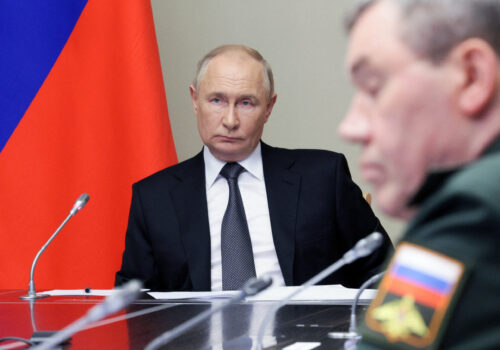World News – 2024 – Video Playlist | Video Playlists | Sites: | newsandtimes.org | links-newsandtimes.com | worldwebtimes.com | southcaucasusnews.com | russianworld.net | jossica.com | octobersurprise2016.org | bklyntimes.com | oceanavenuenews.com | fbireform.com | bloggersunite.net | octobersurprise-2024.org | Trump-News.org | Audio-Posts.com | Bklyn-NY.com | Posts Review – newsandtimes.org
The United States has recently detected indications of increased Russian military activity around key undersea cables, CNN reports. The news is adding to existing concerns over the vulnerability of critical undersea communications infrastructure at a time when the Kremlin is accused of waging an escalating hybrid war against the West in parallel to its ongoing invasion of Ukraine.
Undersea cables play a key role in many aspects of modern society, accounting for the vast majority of digital communication including internet traffic and more than $10 trillion in daily worldwide financial transactions. Hundreds of undersea cables run across the world’s seas and oceans, with cables in the Atlantic Ocean and the North Sea seen as being particularly at risk from potential Russian sabotage.
The world’s critical undersea infrastructure is largely unguarded and its exact positions are available in the public domain, creating a potentially tempting target for the Kremlin. Western intelligence officials believe Russia’s efforts to monitor and build up technical capability to access this vast undersea infrastructure are expanding and are currently spread among a number of different branches of the country’s military and security services, including the Russian Navy and the Main Directorate for Deep Sea Research (GUGI).
Though Russian officials have remained largely tight-lipped over the Kremlin’s alleged interest in undersea cables, former Russian President and close Putin ally Dmitry Medvedev stated in 2023 that there were no longer any constraints left “to prevent us from destroying the ocean floor cable communications of our enemies.”
Stay updated
As the world watches the Russian invasion of Ukraine unfold, UkraineAlert delivers the best Atlantic Council expert insight and analysis on Ukraine twice a week directly to your inbox.
Since the full-scale invasion of Ukraine began just over two and a half years ago, reports of suspicious Russian activity close to undersea cables have been mounting. This threat to underwater infrastructure is viewed as one of the many tools in a far broader Kremlin toolbox of hybrid warfare methods against the West.
In September 2024, CIA and MI6 chiefs accused Russia of engaging in a “reckless campaign of sabotage” across Europe. Alleged recent Russian attacks on communications systems have included disruption to the Global Positioning System (GPS) that affected thousands of civilian passenger flights in the Baltic Sea, Black Sea, and eastern Mediterranean regions.
Attempts to disrupt vital digital infrastructure are all too familiar to Ukrainians. For example, just one month before the start of Russia’s full-scale invasion in February 2022, Moscow launched a massive cyber attack that shut down more than sixty Ukrainian government sites. Russia was also linked to a major attack on one of Ukraine’s largest telecommunications companies in late 2023 that temporarily left approximately twenty four million users without connection to phone or internet services.
Eurasia Center events

Amid mounting alarm over the possibility of Russian attacks on undersea cables, security measures are currently being reviewed and beefed up. NATO has set up an undersea infrastructure coordination group that brings together a wide range of public sector, military, and business representatives to share information regarding potential threats. Late last year, the alliance also announced that it was stepping up naval patrols in the Baltic Sea in response to damage to underwater infrastructure in the region.
In spring 2024, the United Kingdom, the Netherlands, Belgium, Germany, Norway, and Denmark signed an agreement to protect critical underwater infrastructure in the North Sea from potential Russian sabotage. The move came amid recognition that the North Sea now serves as a critical hub connecting European countries through power cables, gas pipelines, and telecommunications links.
Alarm over the security of the world’s vital undersea communications arteries comes as concern mounts over a possible further escalation in Russia’s hybrid war. The Kremlin is believed to be considering a variety of options as it looks to retaliate for Western military support provided to Ukraine. While direct military action is viewed as unlikely, attacks on critical infrastructure could cause chaos and impose significant costs.
With no end in sight to the Russian invasion of Ukraine, the threat to undersea cables looks set to remain for some time to come. A range of measures are already being implemented to improve security, but much more needs to be done. As Western governments look to bolster protection for existing underwater infrastructure, it may also be wise to further expand backup capacity in order to minimize disruption and bolster Western resilience against potentially devastating attacks.
Aleksander Cwalina is assistant director for the Atlantic Council’s Eurasia Center.
Further reading

UkraineAlert
Sep 1, 2024
Key Ukrainian front line city evacuates as Russian offensive gains pace
By
Maria Avdeeva
Evacuation efforts are accelerating in Pokrovsk as Russian troops draw closer amid fears the city will soon become the latest in a growing list of Ukrainian urban centers reduced to rubble by Putin’s invading army, writes Maria Avdeeva.

UkraineAlert
Sep 10, 2024
Ukraine’s biggest wartime government shakeup prompts muted reaction in Kyiv
By
Andrew D’Anieri
Ukrainian President Volodymyr Zelenskyy presided over his government’s largest wartime reshuffle in early September, with nine ministries getting new permanent leadership, writes Andrew D’Anieri.

UkraineAlert
Aug 21, 2024
Invasion? What invasion? Putin is downplaying Ukraine’s Kursk offensive
By
Peter Dickinson
Vladimir Putin’s efforts to downplay Ukraine’s invasion of Russia have severely dented his strongman image and make a mockery of the West’s escalation fears, writes Peter Dickinson.
The views expressed in UkraineAlert are solely those of the authors and do not necessarily reflect the views of the Atlantic Council, its staff, or its supporters.

The Eurasia Center’s mission is to enhance transatlantic cooperation in promoting stability, democratic values and prosperity in Eurasia, from Eastern Europe and Turkey in the West to the Caucasus, Russia and Central Asia in the East.
Follow us on social media
and support our work
The post Concerns grow over possible Russian sabotage of undersea cables appeared first on Atlantic Council.
World News – 2024 – Video Playlist | Video Playlists | Sites: | newsandtimes.org | links-newsandtimes.com | worldwebtimes.com | southcaucasusnews.com | russianworld.net | jossica.com | octobersurprise2016.org | bklyntimes.com | oceanavenuenews.com | fbireform.com | bloggersunite.net | octobersurprise-2024.org | Trump-News.org | Audio-Posts.com | Bklyn-NY.com | Posts Review – newsandtimes.org


